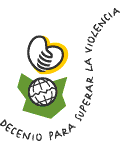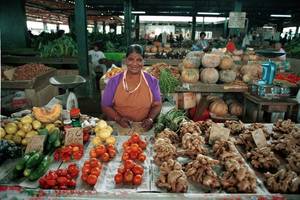Lucy's Reflection
There are images from this film which will stay with me. One is the woman’s pride that they had won access to water for their village – the pictures of the simple communal standpipe. As I run my kitchen tap that image comes to my mind. From far away, these women have given me a gift – for days now I have not taken my kitchen sink for granted but feel blessed to have plentiful fresh water for my family.
And the scene at the meeting of the Board of Directors of the Women’s Bank….living in Switzerland, the heart of international banking world, I delight in the contrast between those women’s bright saris and the sombre suits and high rise opulence of Geneva’s bank.
And the testimonies of these remarkable women – it’s not about money for them. It’s about dignity, respect, solidarity – about not being victims of birth or fate.
And the image of the dancing and the drums stays with me – the sheer joy of dancing with friends!
I’ve never been to India. All I know comes from books and movies, the tv and various Indian friends. I can recognise the poverty in the film but I can’t see how to identify anyone’s caste. To an outsider, caste is invisible but I know the subtleties of discrimination in my own world – the instant judgements we make about class and education and wealth. I hope I have learnt to check myself on many of these – to try and accept people for who they are, not how society categorises them
I remember the governor of the women’s prison in my hometown talking about how some of the women in her care dreaded release because of the instant judgements they will meet constantly in the supermarket or at the school gates. She challenged us “The look in your eyes keeps them in prison. They can only change their lives if you can learn to look at them differently.”
The police and council official in the film had learned to look at these women differently – to view them with respect. Working together, supporting each other, these women now carry themselves with such dignity that they can no longer be denied their place in the wider community.
Jesus spent his life communicating with people as they really were – not as society categorised them. He crossed the caste barriers of his time and invites us to do the same. Amazingly, Jesus still looks directly at you and me – seeing and loving who we really are, not the status we have been born to or worked for. What a liberation – to be loved as we are! In his gaze, I can recognise myself as someone lovable and loving – someone who has a place in the building of the Kingdom of God.
We learn we are loved through the actions of others – love is solidarity in relationship which calms our fears and enables us to work together. In the video, I witnessed the power of solidarity – to educate, to emancipate, to empower and above all, to bring joy.
About the Author
Lucy D’Aeth is an English born New Zealander who has been living in Switzerland for two years. Most of her time at present is taken up being mother to three young children (11,9 and 5), but in previous lives she has studied history and theology and has worked for churches and in Public Health. She is active in her local Lutheran Church and is daily challenged and enriched by living in such a multicultural community.
Christine's Reflection
Already the title of this video, ‘Now we are fearless’, strikes me. What a statement! Fearless.
Where did the fear come from? And how did it depart?
They were paid in food, not in cash, and had to borrow from the landowner for any small need- a debt they had no way of repaying given the unjust interest rates. They had no power to defy the police and corporations that destroyed their flowers without a bribe. They didn’t have the energy or experience to actively question the fact that they were bonded. They sat separately from people of other castes.
Then, with only a little help, they broke free. They set up communities of support. They set up a bank. They began training other women with skills and sharing the skills and knowledge they already had (but might not have valued). They began raising their voices against injustice, articulating their needs, and finding ways of meeting them. They have a newfound respect for themselves, and empowerment, which the community has responded to. The police salute them and the castes begin to mingle as equals.
Where do we need to break free in our lives and communities? When we watch these women, it seems so obvious, the injustices in their lives.
But what about the fears, pain, and injustices in our own lives and communities? What about the deep needs that we are not yet free to articulate and find solutions for? Where have we grown accustomed to injustice? With the assumptions around gender roles? With the unfair distribution of power and influence in our jobs? With the verbal or physical abuse we experience at home? With human trafficking in our midst?
It can seem so unmovable. But look at what these women accomplished in a relatively short period. Overcoming generations of assumptions and patterns.
What did it take? Only a little encouragement. Only a little help. Only a few tools. Coming together in community. Only a little hope. And real results emerge from this creativity, optimism, and community exponentially!
I am challenged to examine my assumptions about what is unchangeable, within me or in the world around me. I am challenged to encourage others around me, even if it seems a small gesture. I am challenged to think deliberately with my communities about changes we are called to. I am challenged to enlarge my expectations about what I and what we can accomplish together, with only the little bit that we can humbly offer.
With the wise woman in the film, I also do not believe in Fate. I also believe in our talent, and I believe in God, who will help us to become all that we were created to be.
About the Author
Christine Housel received her Masters of Divinity from Yale Divinity School (01) and is a member of the Episcopal Church. She currently lives in Geneva, Switzerland where she works as Global Project Manager for the World Student Christian Federation. One area of passion for Christine is working together with girls and women to find their full potential as women and to discover how to stand against all forms of violence, in partnership with likeminded men. The World Student Christian Federation has been a long-time leader and pioneer in empowering women and in finding creative ways to work together, men and women, for gender justice. For more information on the World Student Christian Federation visit www.wscfglobal.org
Maryann's Reflection
I was struck by the insidious nature of the poverty of the Dalit women in India. However, their poverty is more than just a lack of money. For them, power and respect are more important than money.
I went to India once. I was only 14, but I still saw the poverty of that incredibly beautiful and rich country. It was more than ten years ago now, but I still remember the voice of one little girl when she said: “rupee, mummy needs rupee”; I can still see her face when I remember my final day in India.
Yet, these women, even though they were born into extreme poverty and “triple oppression” are choosing respect over money. (These are the buzz words that those of us in the NGO world use, which make us sound so caring, but we do not know what it means to live the life of “triple oppression”). These women have chosen respect and power over money. They have seen that their lives and the lives of their children and their grandchildren will be better if they have respect. If they have the power to lend money within their group their lives will be better. Like Moses mother and Pharaoh’s daughter each woman has to make a small choice, a choice which seems hopeless, but which in the end leads to empowerment of a whole people.
Solidarity is another of these buzz words that we use. I’m in solidarity with the people in India. What does that mean? For me it does not necessarily mean giving money, or even understanding all the intricacies that create the oppression. For me, it means respecting the women who are working there. It means praying for the women that I have met through this video. For me, solidarity with these women is possible because they are choosing to search for power and respect rather than money. If they only wanted money I could perhaps give some, I am from the West after all, but what is more important for them and for me is the respect that comes from creating change in your community.
My experiences in India have given me a glimpse of what it means to be “triple oppressed.” I pray that I never forget that little girl’s face or her voice so that my solidarity is with her as we find ways that we can empower every little girl. This empowerment is through knowledge and faith that God will use normal people, everyday people to create the world on which God and people are waiting.
About the Author
Maryann Philbrook: She is originally from Louisiana in the United States, but currently lives in Austin, TX. She worked for the World Student Christian Federation in Geneva, Switzerland as the Communications Intern in 2009. Maryann started blogging in 2003, but has really picked up the pace since she started working for WSCF in 2009, with her blog about her experiences in Geneva. Maryann graduated in 2006 from Occidental College in Los Angeles, where she received a bachelor’s degree in Politics. After graduating from University she was a Beatitudes Society Fellow, an Episcopal Urban Intern and an English Language Assistant in France. Aside from being passionate about the French language, Maryann’s heart goes out to reconciliation among different strands of Christianity so that a more just world can be created.




